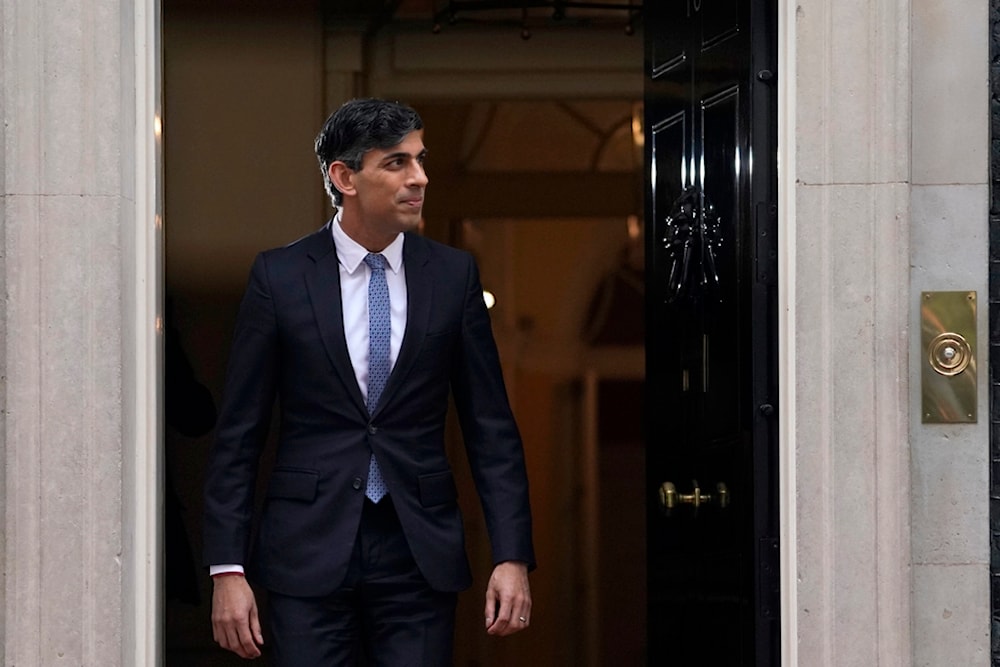UK ups family visa requirements in new anti-immigration law
The UK has increased net income standpoints on families wanting to sponsor relatives visiting the country before granting them travel visas.
-

Britain's Prime Minister Rishi Sunak waits to greet the President of Rwanda Paul Kagame on the doorstep of 10 Downing Street in London, Tuesday, April 9, 2024. (AP)
In an attempt to curb immigration, the United Kingdom legislated a policy that increased the income point of sponsors hosting relatives visiting the country on a family visa.
The minimum income needed to sponsor a visitor is going up by £11,000, from £18,000 to £29,000, and will see a second increase to £38,700 in early 2025.
The order comes as part of Prime Minister Rishi Sunak's plan to "cut unsustainable and unfair levels of migration, and ensure those arriving here do not burden the taxpayer."
Interior Minister James Cleverly said mass immigration has reached its peak in the UK, claiming that the government is acting in the best interest of British nationals to conserve wages and ensure that citizens hosting their families do not accumulate additional burdens on taxpayers.
The income requirement itself is designed for receivers who are self-sufficient and can accumulate the amount needed through savings and personal income. The objective is to cut annual net migration, which currently stands at 745,000, by 300,000.
The government also plans to synchronize the threshold for family and skilled work visas to create a more level immigration system in which family reunifications and skilled migration are equally supported.
Read more: More than 4,600 asylum seekers have arrived to the UK this year
UK businesses resort to international labor recruitment
Due to the UK's wage policy, in addition to the expedited services unemployed persons benefit from, businesses have opted to recruit international workers, upping the immigration crisis.
Over 9 million individuals of working age have withdrawn from the job market, with the economically inactive population swelling by 884,000 since before the pandemic. Despite significant increases in wages, many of these individuals remain hesitant to fill the more than 900,000 available job openings. As a result of this, employers have found themselves compelled to seek crucial staff from overseas.
"International workers are basically propping up the labour market in many ways," Max Mosley, an economist at the National Institute of Economic and Social Research, told The Telegraph. "It is very challenging for employers – the kind of tools they have at their disposal, to raise wages to try to compete, does not work anymore."
According to Home Office data, the issuance of new work visas surged to 169,000 last year, a 50% increase from pre-COVID levels. Moreover, the number of businesses authorized to sponsor visas has more than doubled since 2021, reaching 76,310, indicating the challenges faced by employers in recruiting from the existing UK workforce.
"That is why you might see them look towards international workers. Previously only around 30,000 companies had been registered," Mosley said. The prompt increase in businesses registering came "right at the point the supply of domestic workers got really tight, so over the pandemic in 2021," he said, "reflecting firms potentially becoming frustrated."
UK PM prefers exiting from ECHR over taking immigrants in
This also comes amid the illegal migration crisis the UK has been grappling with for the past few years.
Earlier today, UK Prime Minister Rishi Sunak said the United Kingdom is ready to exit from the European Court of Human Rights (ECHR) if it would help in "controlling the illegal migration" situation.
Speaking on The Sun's Never Mind The Ballots politics show on April 3, Sunak said, "I believe that all plans are compliant with all of our international obligations, including the ECHR, but I do believe that border security and making sure that we can control illegal migration is more important than membership of a foreign court because it’s fundamental to our sovereignty as a country."
The newspaper said that it is the strongest warning so far to "meddling Strasbourg judges" who stopped the first deportation flight to Rwanda in 2022.
Sunak has pledged to slash record levels of regular migration and stop asylum seekers crossing from France to Britain in small boats and insists the Rwanda bill is essential to deter migrants from considering traveling to the United Kingdom via unauthorized routes.
Read more: UK Home Office denying visas to children of migrant mothers

 4 Min Read
4 Min Read










